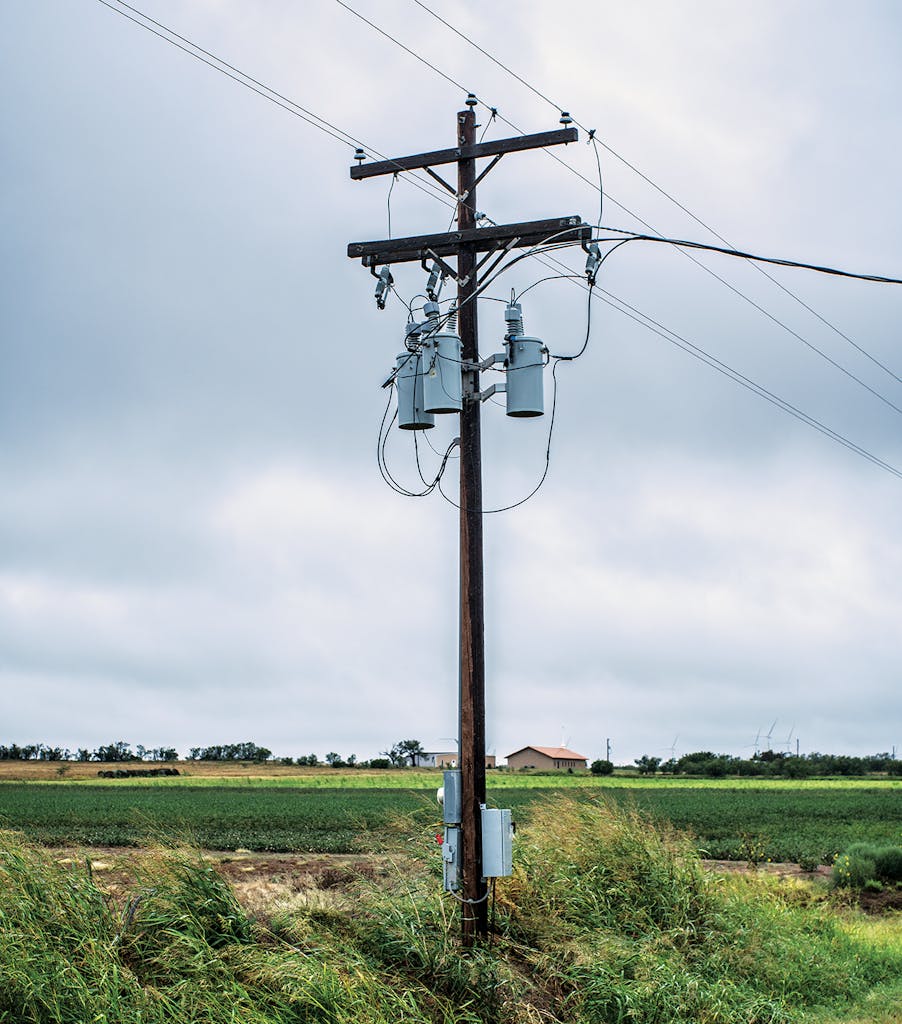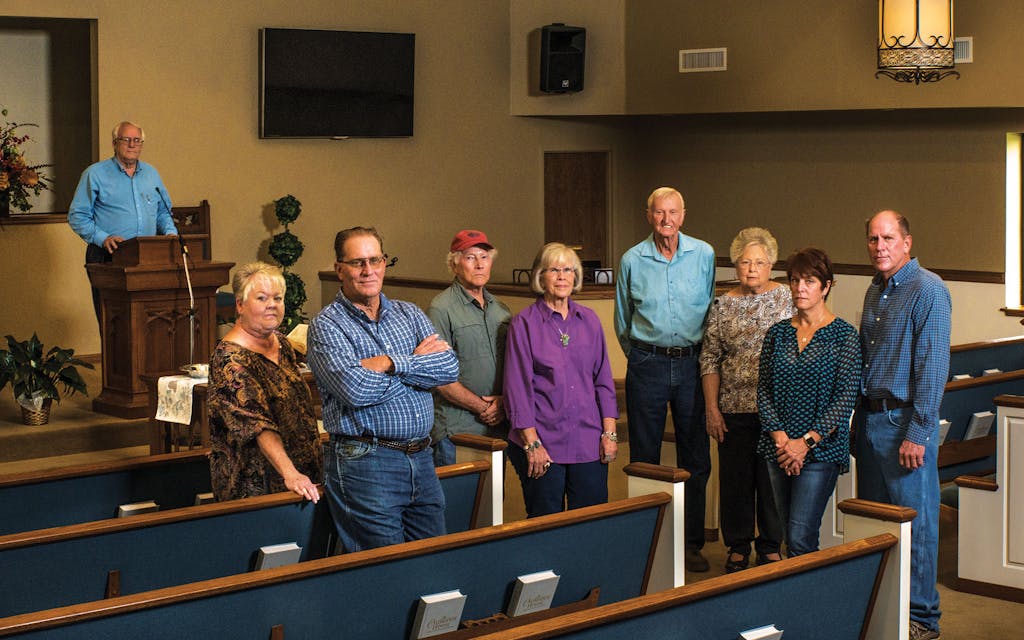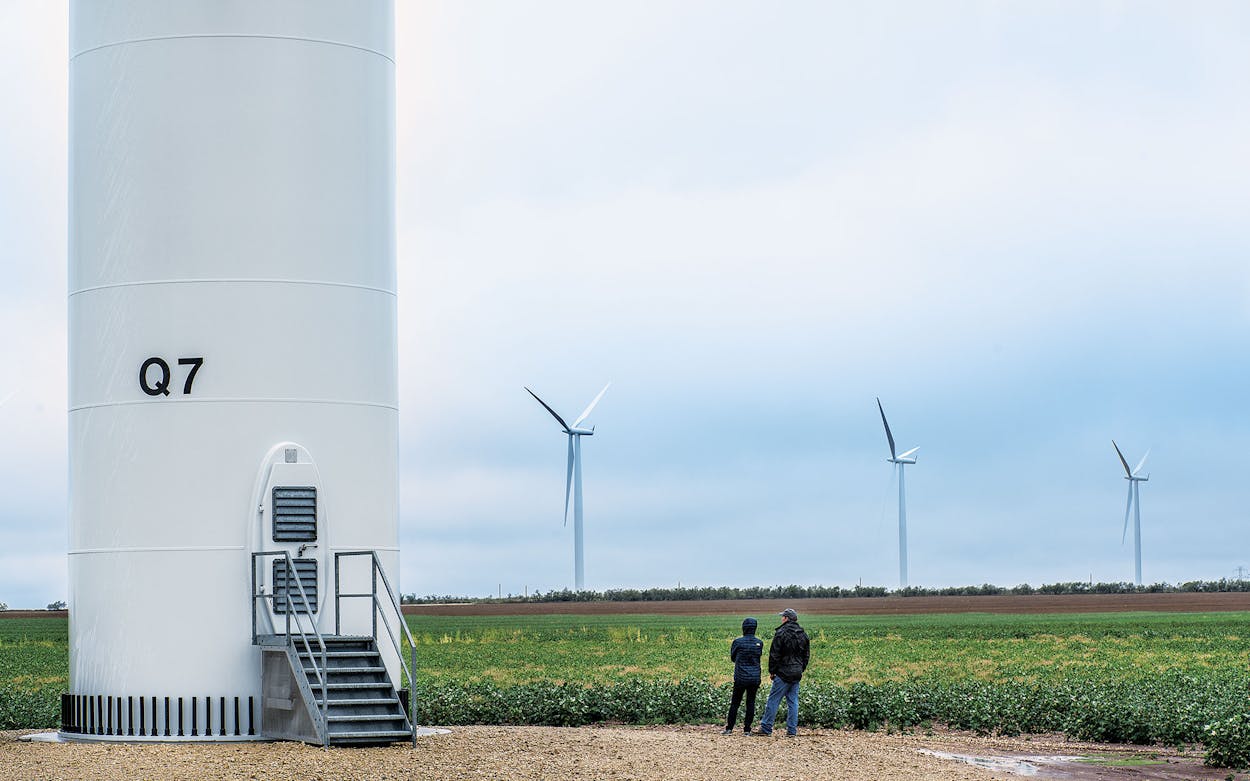This story originally appeared in the November 2017 issue with the headline “Higher Power.”
In the tiny community of Champion, some things are a given: strong southerly winds, wide blue skies, not much rain, and Bruce Parsons. Every week, just before ten o’clock on Sunday, Parsons puts on a black suit and walks across his front yard to Champion Baptist Church. People here count on their pastor. He leaves the doors unlocked. He makes sure the coffee makers are plugged in and percolating before Bible school begins. And he always turns on the lights.
One Sunday morning this summer, Parsons went through this routine before anyone else had arrived. Most of his congregation lives nearby—if not in Champion, then Roscoe or Loraine, the collection of little towns along Interstate 20, fifty miles west of Abilene. The Thompsons, as always, showed up first. Then the Bankheads. Eighty-seven-year-old Wynona Bankhead sat alone this time. Karry Owens, the 52-year-old head coach of the local six-man squad, seated himself in the last pew with his wife, Susan. Danny Thompson, who is 80, sat praying with his great-grandsons. With most of his congregants busy at their farms, planting cotton and harvesting wheat, the pastor was grateful that so many people, maybe twenty in all, could make it to church.
Pastor Bruce, as he’s known around town, spoke that morning about investments—in oneself, in community, and in God. “Money can be destroyed,” he preached. “But the truth is, no matter how much you have, it will probably not end up being enough.” Pastor Bruce signaled Thompson’s great-grandsons, Blake and Blayne, to pass around the offering plates; everyone tithes, even at a time like this.
Earlier this year, Champion Baptist and a handful of other small-town churches across West Texas became the focus of a battle against a utility provider, Sharyland, for cheaper electricity. The state legislature tried and failed to pass a bill this spring designed to lower the price of electricity that these churches have been paying the past few years. “We were just shocked to see our first thousand dollar electricity bill,” Pastor Bruce says. “We had no idea why it would be that much,” especially since the electricity itself only cost about $100.
The $900 difference could be chalked up to the fact that Sharyland charges its customers not for electricity usage but for the cost of moving it through transmission lines. (Most Texans can choose their electricity provider on the retail side of the grid, but they can’t choose the companies that own and operate the poles and lines that transmit and distribute the power.) Sharyland’s high rates caught the attention of state regulators last year, after its parent company attempted to purchase Oncor, the state’s largest and cheapest electric transmission and distribution company, in a deal that would affect close to 10 million Texans. When Texas Monthly first covered Sharyland, just after that deal had fallen through, Sharyland’s customers were left wondering when, if ever, they would get some relief.
But Parsons, his congregation, and the generations before them, have dealt with electricity problems before Sharyland even existed. Most West Texans didn’t have a dependable source of electricity until the mid-forties, when the federal government helped fund enough local electric cooperatives and new transmission lines to create a stable power grid for rural Texas. Electricity has been a little more expensive out here. Folks in Champion have long paid some of the the highest transmission rates in Texas. But when Sharyland took over in 2010, things got worse.
During that same time, West Texas went through booms and busts with natural gas, fracked oil, and wind power. In fact, Champion sits in the middle of the largest wind farm in Texas. Which is particularly galling: as cheap energy flows out of their backyards, residents in Champion are trapped by the expensive lines that bring it back to their homes and farms. And so, after Pastor Bruce finished his sermon, and the last of his congregation found their way home, he made sure to turn out the lights. For a small-town church like this one, every penny counts.

On November 19, 2015, a couple hundred West Texans crowded into a ballroom at the Hotel Settles, in Big Spring, for the annual meeting of the Office of the Public Utility Counsel, a government agency charged with representing the state’s residential ratepayers as a whole. The agency hadn’t held a meeting in West Texas in several years, but complaints about Sharyland had caught their attention. The farmers and the schoolteachers gathered at the hotel wanted to know why their rates were so high, and what the government was doing to help.
Agency officials, it turned out, had largely remained silent after Sharyland petitioned the state, in the spring of 2013, for a rate increase. Local newspapers announced the pending negotiations, and customers received letters warning them about the proposed change, but other than that, ratepayers felt defenseless. Sheri Givens, the agency’s public counsel at the time, said the agency was overwhelmed with other litigation and lacked the proper resources to intervene.
In January 2014, the state approved Sharyland’s current rate, which is two to three times as high as anywhere else in Texas. By the time of the 2015 meeting at the Hotel Settles, people were buckling under the high price of electricity. Wendell Bankhead, one of Wynona’s sons, and his wife, Debby, for instance, spend about a third of their $1,500 monthly income on electricity. The Bankheads drained their savings account when their bills first started going up a few years ago. Then they started cutting back. No satellite television or expensive clothes and fewer Christmas lights for the yard. “We just have enough left to pay our bills and survive,” Debby said.
The Bankheads’ situation is a common one in rural communities like Champion. Just go to church and sit a little while; someone like Danny Thompson will surely bring up his electric bill (“It’s highway robbery!”). Track down a farmer like Monte Richburg on his wheat field and listen to him rant (“Us little guys just sit here and take it, and that’s all we can do!”). Or dial up a single mother like Mari Torres-Keys and visit with her as she sits in the dark (“I make sure that I unplug everything because I don’t know what else to do”).
Sharyland, at least in part, charged more to cover the cost of running utility lines that served such a small customer base, about 54,000 customers, in remote areas. Moving electricity to rural Texas is complicated. Nancy Raney, an alfalfa farmer in Big Spring, told Texas Monthly in 2016 that she paid twice as much for electricity as her neighbors across the street; their lines were owned by Oncor.
As part of the 2014 rate increase, churches like Champion Baptist were reclassified as commercial customers, meaning they would be billed for how much electricity they could consume rather than how much they actually used. That Bruce Parsons only turned on the lights for a few hours on Sundays and Wednesdays didn’t matter much; Sharyland charged them like a business running full-steam 24 hours a day, all week long. In a typical month, Champion Baptist pays about $700: $100 for power and $600 for the power lines.
“We’re not asking for a free wire charge by any means. We’re just asking for a fair price,” said Randall Bankhead, Wynona’s other son and the church treasurer. “It’s vitally important to our community that we keep our church.”
During the legislative session this year, state senator Charles Perry filed SB 1510, a bill that would restructure the way churches are billed by Sharyland. “They’re out there doing the Lord’s work and being billed as a big commercial entity,” Perry said. “And when the utility with the highest rates in the state can serve people that are literally across the street from the utility with the lowest rates in the state, we must get creative about how to address that problem.”
The bill passed the Senate unanimously, but the Association of Electric Companies, an industry trade group, weighed in once the bill reached the House. “We believe it creates a precedent that could be harmful to other utilities,” Julia Rathgeber, the group’s CEO, told a House committee in May. “We’re sensitive to the cost pressure that the churches face, but we believe the appropriate place for setting electricity rates is at the [Public Utility Commission].” Representative Stan Lambert, from Abilene, who filed the House’s version of the bill, told the Texas Tribune that though the legislation ultimately died in the House, he hoped the public debate would “push Sharyland forward and make sure they’re committed to resolving this.”
At the beginning of October, the PUC was working to finalize a deal that allows Oncor to take over Sharyland’s distribution lines and customers in exchange for $400 million of assets—a turnabout from a year ago, when it was Sharyland’s parent company that tried to buy Oncor. The company says its new customers could see their bills decrease by up to half after the deal is approved.
“This is a good deal for Texas,” said Mike Guyton, Oncor’s chief customer officer. “We look forward to welcoming our new customers soon.”

By the time Randall Bankhead stops his tractor, it’s often eight or nine o’clock in the evening, and at this hour, almost everything is beautiful. The sky is dark peach, and the air is cool. The uncut wheat fields almost whisper in the breeze. And when the sun finally sets on Randall’s farm, hundreds of red flashing lights begin to dot the night sky. The wind turbines are turning.
Along with serving as Champion Baptist’s treasurer, Randall is a 57-year-old fourth-generation farmer who works his great-grandfather’s land just up the road from the church, growing cotton, wheat, and corn. He’s lived through hailstorms and drought, and like most of his neighbors, he’s never much cared for the wind. It carries away the moisture that feeds his crops, and it brings in the sand and dirt that cut down his cotton. But these days he finds himself more upset with the giant wind turbines that surround the community than with the wind itself. “If you don’t own any land, or these turbines aren’t on the property you do own, they don’t make any economic difference to you whatsoever,” he said. “They’re just another obstacle on the landscape.”
That’s the strange thing about West Texas. What people depend on the most, the land, seems to always serve someone else. When Oncor starts sending electricity to the homes and farms in the area, at a better rate than Sharyland, it will also be moving cheap electricity from the wind turbines to other parts of the state. The savings have never materialized for the people who live closest to them.
For now, the people in Champion are hoping the Oncor deal will lower their bills. But the latest news in town—that California energy giant Sempra is buying Oncor’s bankrupt parent company—has left people in Champion wondering, once again, what will happen next. If the deal is approved, Sempra has promised to invest in new transmission lines and infrastructure in West Texas. But it has to spend billions to reorganize the company and pay down debt. Everyone in Champion is thankful that Sharyland’s days are numbered, but they say they’re skeptical at best.
“We’re always hopeful that big changes are coming, but we’ll believe it when we see it,” Randall said. “If it happens, we’ll use the extra money to help the community or give our pastor a pay raise. Paying $600 a month for electricity is not a very good way to spend God’s money.”
Adam Iscoe is a writer from Austin, Texas.
- More About:
- Energy







